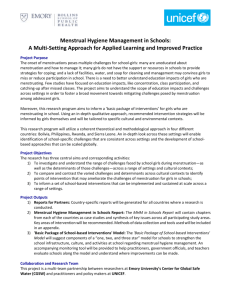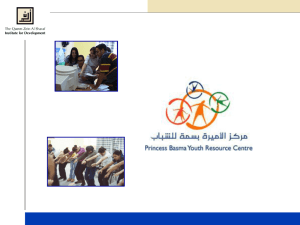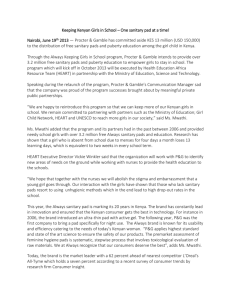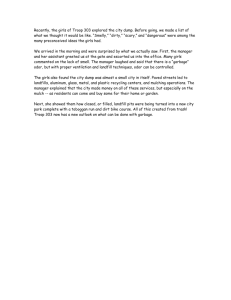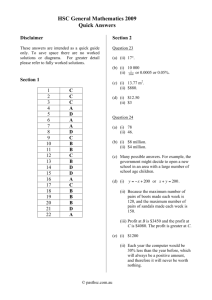Proposal For Funding Submitted To Abt Associates In
advertisement
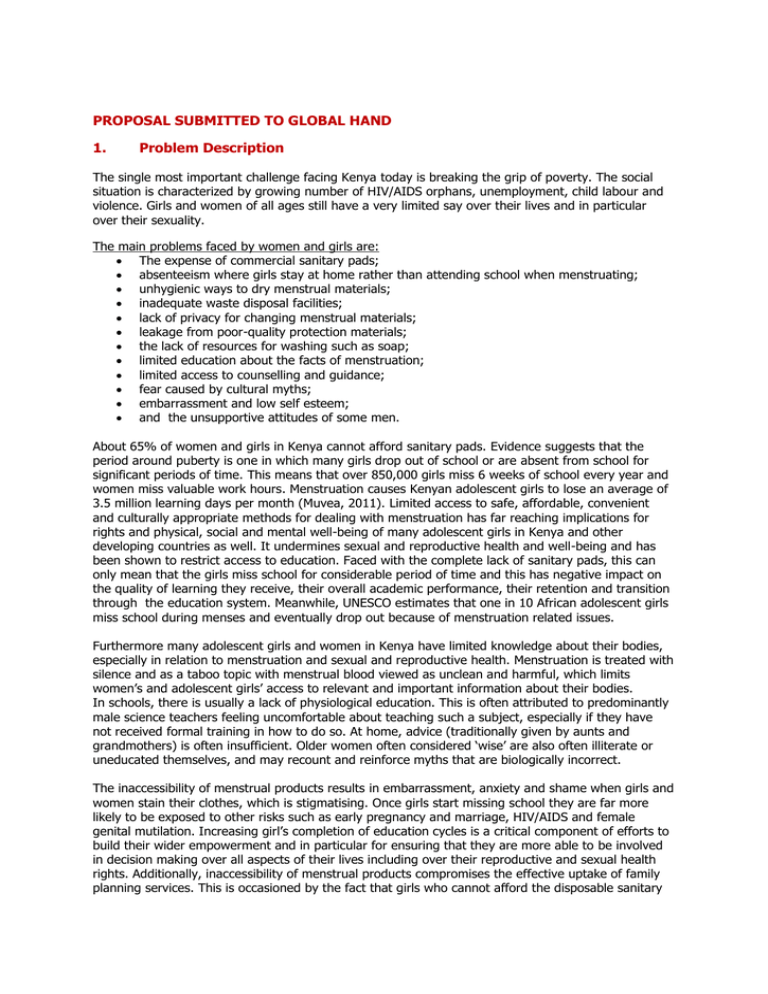
PROPOSAL SUBMITTED TO GLOBAL HAND 1. Problem Description The single most important challenge facing Kenya today is breaking the grip of poverty. The social situation is characterized by growing number of HIV/AIDS orphans, unemployment, child labour and violence. Girls and women of all ages still have a very limited say over their lives and in particular over their sexuality. The main problems faced by women and girls are: The expense of commercial sanitary pads; absenteeism where girls stay at home rather than attending school when menstruating; unhygienic ways to dry menstrual materials; inadequate waste disposal facilities; lack of privacy for changing menstrual materials; leakage from poor-quality protection materials; the lack of resources for washing such as soap; limited education about the facts of menstruation; limited access to counselling and guidance; fear caused by cultural myths; embarrassment and low self esteem; and the unsupportive attitudes of some men. About 65% of women and girls in Kenya cannot afford sanitary pads. Evidence suggests that the period around puberty is one in which many girls drop out of school or are absent from school for significant periods of time. This means that over 850,000 girls miss 6 weeks of school every year and women miss valuable work hours. Menstruation causes Kenyan adolescent girls to lose an average of 3.5 million learning days per month (Muvea, 2011). Limited access to safe, affordable, convenient and culturally appropriate methods for dealing with menstruation has far reaching implications for rights and physical, social and mental well-being of many adolescent girls in Kenya and other developing countries as well. It undermines sexual and reproductive health and well-being and has been shown to restrict access to education. Faced with the complete lack of sanitary pads, this can only mean that the girls miss school for considerable period of time and this has negative impact on the quality of learning they receive, their overall academic performance, their retention and transition through the education system. Meanwhile, UNESCO estimates that one in 10 African adolescent girls miss school during menses and eventually drop out because of menstruation related issues. Furthermore many adolescent girls and women in Kenya have limited knowledge about their bodies, especially in relation to menstruation and sexual and reproductive health. Menstruation is treated with silence and as a taboo topic with menstrual blood viewed as unclean and harmful, which limits women’s and adolescent girls’ access to relevant and important information about their bodies. In schools, there is usually a lack of physiological education. This is often attributed to predominantly male science teachers feeling uncomfortable about teaching such a subject, especially if they have not received formal training in how to do so. At home, advice (traditionally given by aunts and grandmothers) is often insufficient. Older women often considered ‘wise’ are also often illiterate or uneducated themselves, and may recount and reinforce myths that are biologically incorrect. The inaccessibility of menstrual products results in embarrassment, anxiety and shame when girls and women stain their clothes, which is stigmatising. Once girls start missing school they are far more likely to be exposed to other risks such as early pregnancy and marriage, HIV/AIDS and female genital mutilation. Increasing girl’s completion of education cycles is a critical component of efforts to build their wider empowerment and in particular for ensuring that they are more able to be involved in decision making over all aspects of their lives including over their reproductive and sexual health rights. Additionally, inaccessibility of menstrual products compromises the effective uptake of family planning services. This is occasioned by the fact that girls who cannot afford the disposable sanitary towels more often are more at risk of manipulation by men who promise to provide them with the money to buy the pads. Eventually they are forced to have sexual relationship which ultimately leads to unwanted pregnancies and further risks of maternal and child health related problems as they are normally not prepared to take care of children at these early ages. 2. Description of the Solution Making reusable pads (I-Care Pads) has radically proved to create a world where women and girls can step boldly into the promise of their future. The product was developed in collaboration with Kenya Industrial Research Development Institute (KIRDI), who played the role of carrying out a feasibility study, research on product development and assessment of its impact to the girls and women. The goal of the enterprise is to empower the vulnerable girls and women through provision of reusable pads and capacity building on menstrual hygiene management and reproductive health for improved performance and self esteem. This will be done through production and distribution of reusable sanitary pads as well as ensuring provision of menstrual hygiene management education and facilities to girls in primary schools in Kenya. By acquiring knowledge on menstrual hygiene management, the overall health status of the girls will be enhanced as myths and misconceptions that surround puberty and menstruation will also be demystified. The vision of producing I-Care pads is to ensure empowered girls and women in charge of their own socio-economic development while the mission is to produce high quality re-usable sanitary towels responding to clients tastes and preferences for self comfort and personal hygiene. Furthermore a study in Kenya by Ministry of Education in 2007 found that sanitary pads provision coupled with sexual and reproductive health education could reduce absenteeism amongst girls by over 3.5 days per month and brought other important benefits in terms of girls self esteem and self confidence. Findings from a survey conducted by Kenya Industrial Research Institute (KIRDI) in 2011 among piloted users of reusable pads (I-Care pads) revealed that only 5% of the respondents were unable to attend school during menstruation solely because of cramps/pain. If this is compared with school absenteeism prior to the pilot (27%), then the use of I-Care pads argubaly significantly improved the school attendance of the pilot group. This project intends to promote the social marketing and distribution of reusable sanitary pads (that were developed and made in Kenya and meet required quality and safety standards) to marginalised girls in selected poor and marginalised communities. The promotion and distribution of the reusable pads will also be an entry point for the promotion of wider action on menstrual hygiene and reproductive health rights focused on schools and involving the wider community. An integrated approach of this type has not been carried out in these areas before. The use of the disposable pads currently on the market is estimated to be Ksh1,620 per girl per year. In rural areas where transport networks are often poor, ensuring a regular supply of disposable pads at an affordable cost is likely to be challenging. Ensuring the safe disposal of disposable pads is also a major challenge as unsafe disposal carries with it attendant environmental and health risks. One packet of the reusable pads that will be promoted through this project is sufficient to meet the sanitary needs of a girl for a year at a cost of Ksh 300. The adoption of reusable pads is therefore more likely to be sustainable in the long term whether it is financed by development partners, from household expenditures or by implementing a sustainable model like “the Mayenya Model”. In the model, the school and parents take their responsibility in providing the pads to the girls by paying a sanitation fee on yearly basis. This model also promotes gender equality, as every parent have to pay for every pupil. Reusable pads of the type to be used will also be more environmentally friendly than the disposable type and the training provided covers safe disposal and management aspects. Using the promotion and distribution of reusable pads as an entry point for engagement on wider issues related to menstrual hygiene and reproductive health, the project will also demonstrate how opportunities for contact with girls and communities on a specific issue can also be used to promote and develop wider action on issues that affect girls health status, access to quality education and the achievement of better education outcomes and will identify appropriate strategies for doing so. In I-Care proposal powered by Afri-Can / GlobalHand-2013 Page 2 / 9 the meantime, campaigns to demystify menstruation will be rolled out at grassroots school levels. These campaigns will aim to make adolescent girls recognise that they are contributing to the silence and stigma around menstruation and encourage them to use their voices to talk about the topic and themselves, and to demand their rights. The main objectives of the programme are: 2.1. to improve school attendance among girls between the ages of 10 and 15 years in primary schools; to increase access to 10,000 vulnerable adolescent girls with sanitary towels and comprehensive menstrual hygiene management knowledge and risk awareness of HIV&AIDS among in-school and out of school girls between the ages 10 to 15 years; to increase the self-esteem of needy girls between ages 10 to 15 years; to improve economic status for out of young women between 18-34 years; and to document lessons learned and scale-up options documented. The Model and Justification The beneficiary's need being met through this project includes provision of reusable sanitary towels (pads) which are the preferred sanitary protection for most women and girls. And while pads are preferred, the disposable ones are expensive. Still, many adolescent girls and women in Kenya have limited knowledge about their bodies, especially in relation to menstrual hygiene and reproductive health. For young girls in poor rural settings who often receive minimal instruction on what menstruation is and how it can be managed, the experience has been described as frightening, confusing and shame-inducing. Thus menstrual hygiene management capacity building will be another service provided through this project. The product is compelling to the customers due to the following reasons: It is a hygienically approved, high-quality, affordable reusable product that responds to customers tastes and preferences for self comfort and personal hygiene. The product can be used for a period of one year. Thus the girls will be able to attend school without worrying about menses and through this project there will be a significant reduction of girl-parent dependency for sanitary towels every month. Through the use of the I-Care sanitary towels, issues of environmental conservation will be realized as the pads contain fewer chemicals compared to the disposable pads. Furthermore this is a Kenyan made product by the women for the women and will go a long way in creating more employment opportunities for the vulnerable women. Generally, the taboos associated with menstruation have ultimately led to reduced levels of confidence and active involvement of girls in schools. The taboo related loss of confidence among girls has had direct impacts on girl’s exposure to risks such as early pregnancy, marriage and HIV AIDS. In schools, there is usually a lack of physiological education while at home, advice (traditionally given by aunts and grandmothers) is often insufficient. Therefore this project is compelling as it seeks to bridge the gap that exists in limited knowledge about the biological process of menstruation among the girls and women. While the I-Care pads is not a new product per se as the product has existed in the market now for a period of one year, the menstrual hygiene management training is a new service as it is a component that will be introduced in schools for the very first time. There are a number of organizations currently implementing interventions in schools in the project area but these capacity building interventions majorly revolve around food hygiene, general hygiene and hand washing. The type of relationship that each of our beneficiaries expects us to establish and maintain is a personal assistance approach given the personal nature of the product. As such, this project envisions to provide exactly that personal touch through the trainings that will be offered at two levels: I-Care proposal powered by Afri-Can / GlobalHand-2013 Page 3 / 9 1. To the female teacher focal points and the training sessions to be conducted in schools before distribution of the pads and during the monitoring visits. 2. For the women in the neighborhoods, the girls trained will be expected to relay the same information to them and also inform them where the product can be found. Afri-Can Trust currently works with community volunteers (I-Care ambassadors) who are trained on the benefits of the product and how to handle it and are able to buy the product from the organization at a lower price and sell to the interested community members at a profit. In terms of customer segmentation, this project is basically creating value for women and girls from the ages of 10 years and above. Though the project will target girls in primary schools, efforts are currently underway to reach the mass market including secondary schools with this innovative product. The resources that this project will use to address the customer needs includes physical, human and financial resources. Physical resources: The building (the production unit) The production machines which are already in place A vehicle to support the distribution of the product and also to be used during trainings in schools. Currently the organization has one vehicle that it uses for marketing purposes. Human resources: The production unit where 10 seamstresses will be engaged for production purposes. Currently the organization has engaged 6 seamstresses in the production unit, but owing to the quantity of products that will be required, an additional 4 staff will be recruited. The managing trustee who oversees the project, the executive director, two project officers in charge of training, the administrative officer and a driver will constitute the project team. Financial resources: Will be required especially to expand the production unit; To pay 50% of the staff salaries; and To offset the direct and indirect costs which include cost of production materials, laboratory analysis and testing for product improvement and quality control, monitoring and evaluation, communication and transport among others. Promotion To this end the organization has reached the beneficiaries through a number of channels that include: Social media networks (Facebook page: https://www.facebook.com/ICarePads , Twitter account / ICarePads and own website: www.icarepads.com ); Out-door promotions; Out-door activations where a team from the organization has visited various markets and schools to give sensitization talk to the targeted customers; and Audio channels like the radio mainly adopting the commercial spots and radio talk show to advertise the product. Through this project, the organization will reach the beneficiaries through direct personal encounters occasioned by visiting the schools to enlighten the pupils and school management committees about the product. Also the use of radio talk shows in local vernaculars and social media will continue to be scaled up to reach the targeted beneficiaries to benefit from this affordable, sustainable and innovative product. Still, the organization has regularly been sending to both the potential and actual partners’ newsletters, brochures and other promotional items such as branded t-shirts to ensure that product knowledge is improved. I-Care proposal powered by Afri-Can / GlobalHand-2013 Page 4 / 9 4. Impact Up to 10,000 girls from marginalised communities within 100 primary schools will benefit from the project. The project will have an impact on health status of girls through improvement in the health status and personal hygiene of the girls as a result of using the reusable pads. This will be realised in the sense that girls will no longer have to use unhygienic materials like old pieces of cloth or old newspapers that most of them are currently using during their menses. Also considering the fact that the first menstruation is often horrifying and traumatic to an adolescent girl because it usually occurs without her knowing about it, the knowledge and understanding of girls on menstrual hygiene and reproductive health issues will be enhanced further leading to improved health status, increased levels of confidence and active involvement of girls in school. It is consequently anticipated that by providing the reusable pads, the number of days of education that a girl might receive as a result of this initiative could increase by as much as 3-5 days in a month. Ultimately, there will be a significant reduction in the rate of school dropout as well as reduced vulnerability of the girls to early engagement in sex in order to get income for acquiring the basic needs like sanitary pads. Girls that are regularly absent from school are more likely to be those that drop out and fail to transit successfully through the education system. By reducing the number of days of absence currently related to their menstrual cycle, it is anticipated that retention and transition rates amongst girls at individual schools could improve by up to 60%. Girls will therefore be able to go to school and participate in school activities thereby ensuring a holistic development i.e. mental, physical and social development. With the significant reduction in drop out cases amongst girls, which ultimately will lead to improved performance of girls in schools, these will eventually culminate into increased income opportunities for girls as they finish school and are able to access more opportunities for income earning/generation and dignified livelihoods. The provision of reusable sanitary pads coupled with the proposed activities involving girls, boys, and the wider community on menstrual hygiene and rights are likely to have important direct impacts on the economic status of up to 10 households considering that about 10 women from vulnerable backgrounds will be engaged in the production of the reusable pads. By mainstreaming an innovative group level savings mobilisation methodology to improve the income sources and productivity of the resource poor and vulnerable community members engaged in this project as production staff, increased income for these families will be realised. Recognising that girls from low income families which this project will focus on engage in transactional sex to get money for pads further predisposing them to higher likelihood of contracting HIV as they are not able to negotiate with their partners to use protection, the proposed activities will have direct impacts on up to 10,000 girl’s exposure to risks such as early pregnancy, marriage and HIV AIDS given that the project will equally address issues of individual and communal behaviour change with regard to adolescent sexuality, menstrual hygiene health and reproductive health rights issues. Additionally, issues of environmental conservation will be addressed as the problems posed by disposing the sanitary pads in schools will be a thing of the past. The locally produced low cost pads (I-Care pads) are more environmentally friendly compared to commercially produced pads because they contain fewer chemicals such as polyacylate superabsorbent gels. Their use will ultimately lead to environmental conservation. When the health clubs in schools have embraced the I-Care concept especially the Red Visitors Booklet ( information booklet on menstrual hygiene and reproductive health issues and rights developed using cartoons and graphics) discussions, myths and taboos surrounding the menstruation will be addressed. Pupils and students will receive information about menstrual hygiene management (MHM), about biological facts and practical ways of managing blood flow in a hygienic and discrete way. Through the knowledge that the beneficiaries will get through the programme, more awareness and capacity enhancement on natural family planning methods will be reinforced. Also by focusing MHM education towards both boys and girls, this will foster more understanding attitudes and decreased social stigma in schools. I-Care proposal powered by Afri-Can / GlobalHand-2013 Page 5 / 9 5. The Project Scope This project will be implemented in Nyanza region located in Western Kenya on the shores of Lake Victoria. The region has a population of 4,392,196 within an area of 16,162 km², and is divided into 12 districts namely Bondo, Gucha, Homa Bay, Kisii, Kisumu, Kuria, Migori, Nyamira, Nyando, Rachuonyo, Oyugis, Siaya and Suba. Nyanza is the poorest region in Kenya with poverty levels ranging from 65% to 80% (Ref: Where are the Poor, Geographical Dimensions of Poverty in Kenya , 2006, Kenya National Bureau of Statistics). It also has the lowest life expectancy of 46 years compared to 64 years in the Central region and a national average of 48.93, as a result of having the highest HIV and AIDS prevalence in Kenya. Only 0.6% of the population has access to piped water while a paltry 5.1% have access to electricity. About 50% of Kenyans live below the national poverty line, which means they cannot afford enough food to meet minimum calorie requirements and basic non-food needs. This implies that more than 50% of the target customers who are women and girls in and out of school in Nyanza region where the project will target earn less than one dollar (Kshs 85) per day. According to the Kenya Demographic Health Survey 2008-09, owing to high fertility and declining mortality, Kenya is characterised by a youthful population. Projections show that about 43% of the population is younger than 15 years (Central Bureau of Statistics,2006). The data for household composition show that, at the national level, women head 34 percent of Kenyan households, a pattern which is replicated in Nyanza. Consequently, women and girls in Nyanza are faced with a formidable challenge of accessing opportunities for a safe, healthy, and economically productive future. The use of the disposable pads currently on the market is estimated to be Ksh1,620 per girl per year. This translates to about Kshs 135 per month. Considering that most of the targeted population earn less than Kshs 85 a day, it means that the contemporary pads are far much unaffordable to the customers. The cost of sanitary ware and towels is beyond the reach of most young women and girls, who in the targeted project area are the majority of the unemployed and those living in poverty. The ability of women and girls to generate income and own assets to ensure food security, material well-being and social status is very weak in the project area. Thus the enterprise currently serve about 4,000 women and girls annually which translates to about 1%. Through the proposed activities in this programme, additional 10,000 girls will be reached. The activities proposed will increase the market in that 100 schools in Nyanza will be targeted directly. This implies that about 10,000 girls will be reached directly while additional girls will be reached through the various channels like radio promotions using the local vernaculars apart from the women and girls who will be reached indirectly through the word of mouth from the project beneficiaries. I-Care proposal powered by Afri-Can / GlobalHand-2013 Page 6 / 9 6. Activity Plan i) Production and distribution of 10,000 reusable pads (I-Care pads) The project will entail expansion of I-Care pads production unit and recruitment of additional production staff after which the project will be introduced in schools through the school management committees. Afri-Can Trust will produce and distribute kits of reusable sanitary pads (RSPs) and other essential resources to at-risk adolescent girls in Kenya. Each kit comes bundled in a pack, and includes: four RSPs (i.e. two for heavy flow and two for light flow. The pads can be worn for eight hours before changing); detergent-grade soap for washing the pads; a re-sealable waterproof bag for storing used pads; and a detailed instructions for proper pad use and maintenance. ii) Product improvement and quality control To ensure product improvement and quality on a continuous basis, different types of materials will be acquired for each layer of the pad based on availability and their characteristics (absorption, water repellent, top and bottom layer). Thereafter, development of cotton based laminates or blends to improve the performance for each layer of the reusable sanitary pad taking into consideration the important properties required for sanitary pads as per the recommendations provided by technical committee on Towels, Medical and Hygienic Textile Product will follow. This includes laminating fabric preparation and testing properties of the laminates; prototype development based on cotton blends; research on the best cost effective locally produced sanitizer for after use cleaning; and quality control of the product through fabric testing, physical and chemical, and microbiological laboratory analysis iii) Building the capacity of 10,000 girls on menstrual hygiene management A one day workshop for 100 female teachers drawn from 100 schools will be conducted. The female teacher trained from each of the 100 schools will be the focal point for menstrual hygiene and girls questions in general. This focal point will be responsible to answer questions on demand and manages the stock of sanitary protection material for emergencies. The teachers will also be trained on how to convey biological facts in a sensitive manner. There after a two session training will be conducted in each school using a participatory developed information booklets using cartoons (Red Visitors Booklets). A story line has been developed in the Red Visitors Booklet, in this story line, the girls talk about the challenges they are facing such as their menses, the leaking menstrual materials, the myths, the dreams they have, sexual abuse, laughing of the boys, and missing of school. The first session will involve boys and the vulnerable girls identified to benefit from the reusable pads participating while the second session will involve girls including the I-Care ambassadors who will be health club members. On a regular basis ( health club meeting every two weeks and once in a year a girls day event), the club will be expected to organize group meetings, information events for younger girls. The training which is intended for school children between the ages of 10 and 15, will provide information on menstrual hygiene management, HIV, and reproductive health and rights. iv) Monitoring and evaluation The programme will develop an elaborate monitoring and evaluation framework with clear process and output indicators outlined in a logframe. A baseline assessment will be done to establish the existing status in the schools where the program will be implemented. At the end of the programme an evaluation will be undertaken with key lessons documented. The baseline analysis will form the basis of the evaluation within the schools. Program outcomes will be measured by determining whether, and how, the sanitary needs of vulnerable girls are being adequately met. To do this, the program will measure the reduction in school absenteeism as well as the psychosocial well-being of girls, and the degree to which their needs are met and their voice heard. Measurements will be made qualitatively and quantitatively before and after the program against a baseline survey instrument designed by a monitoring and evaluation expert before the commencement of the implementation. I-Care proposal powered by Afri-Can / GlobalHand-2013 Page 7 / 9 The technical resources that will be required during the implementation of this project mainly remains ensuring the product (I-Care pads) improvement and constant quality control. This technical support will be provided by KIRDI which already has a working partnership with Afri-Can Trust. The other functional support that will be required include engaging consultants to undertake baseline and evaluation studies before and after project implementation. Still, the project will engage the services of a qualified accountant to ensure proper documentation and accountability to the donors and the beneficiaries. 6.1 Detailed Plan of Activities and Budget ACTIVITY TIME FRAME July-Dec 2013 Jan-June 2014 J A S O N D J F M A M J Production and distribution of 10,000 reusable pads (I-Care pads) Conduct familiarization visits to schools Procuring materials and producing reusable pads Development of detailed instructions for pads use Distribution of pads in schools and monitoring Building the capacity of 10,000 girls on menstrual hygiene management Staff induction on the project Mobilisation of school management committees and heads Design, development and production of IEC materials (Red Visitors Booklet) TOT workshop for focal point teachers Menstrual Hygiene Management trainings School health club/ambassadors meetings Undertaking a girls day event Girls sharing at home how fathers and fathers can support them during their menses Periodic staff planning and review meetings Monitoring and Evaluation Conducting baseline survey Undertaking monitoring visits Evaluation Capitalisation workshop of the programmes’ achievements Product improvement and quality control Acquisition of different types of materials for each layer based on availability and their characteristics Quality control through fabric testing, physical and chemical, and microbiological laboratory analysis I-Care proposal powered by Afri-Can / GlobalHand-2013 Page 8 / 9 7. Organization Capacity and Partnerships Afri-Can Trust brings extensive experience in the production and distribution of reusable sanitary towels as well as provision of capacity building and institutional development skills. The organization has a rich history of working in schools and at community level in the project areas including on menstrual hygiene education, HIV and reproductive health rights issues. Afri-Can Trust has acknowledged the importance of combining work focused on HIV/AIDS prevention with wider interventions in the sector. Work on HIV/AIDS eventually developed into a wider focus on menstrual hygiene and reproductive health rights. Afri-Can Trust was instrumental in helping to initiate and establish a collaboration with Kenya Industrial Research and Development Institute (KIRDI) towards undertaking feasibility study, research on reusable pads development and assessment of its impact to the girls and women. The process involved the end users giving their input and recommendations on the product design. Afri-Can Trust has also networked with a number of North-South organisations working in both education and MHM to build mutual capacity and understanding on how to use the experiences and knowledge of network members to develop evidence based approaches for addressing menstrual hygiene management issues, especially for girls who are in formal education. Afri-Can Trust’s coherent management exhibits complementarities between management, programs and finance administrative support functions. The management provides oversight in executing the roles of capacity building, product development and improvement, and strategic funding. Programs are well aligned and conform to the core mission: to alleviate poverty and ensure sustainable development through empowering and creating opportunities for the vulnerable and marginalised community members. Through support functions, project funds/resources are effectively allocated, efficiently utilized and status properly documented and accounted for using the in-place accounting systems and procedures. Afri-Can Trust maintains its accounting records using improved accounting software and technology. Back ups are done every day. The accounting program is password protected, with user access only granted only to authorised personnel. The system is reviewed annually to determine if it meets the needs of Afri-Can Trust's accounting requirements. The local partner who will take part in this project is a well established organization that has extensive experience of working within the selected communities or specific expertise on a particular issue or subject that will be addressed by the programme. Kenya Industrial Research and Development Institute (KIRDI) is a national research institute established in 1979 under the Ministry of Trade and Industry and mandated to undertake multidisciplinary research and development in industrial and allied technologies. The institute’s core objectives are handled by the Research and Technological Innovation (RTI) department. The major RTI divisions are: Engineering, Energy and Environment, ICT, Leather & Textiles, and Food Technology Divisions. The core functions of the Institute as outlined in the Science and Technology Act Cap 250, Laws of Kenya are to: Co-operate with the responsible Ministry of industrialization and the relevant research committee in matters pertaining to research policies and priorities. Carry out research and development in the fields specified in the mandate. Co-operate with other organizations and institutions of higher learning in training programmes and on matters of relevant research. Disseminate research findings. Co-operate with other organizations and institutions of higher learning in training programmes and on matters of relevant research. Liaise with other research bodies within and outside Kenya carrying out similar research. I-Care proposal powered by Afri-Can / GlobalHand-2013 Page 9 / 9

